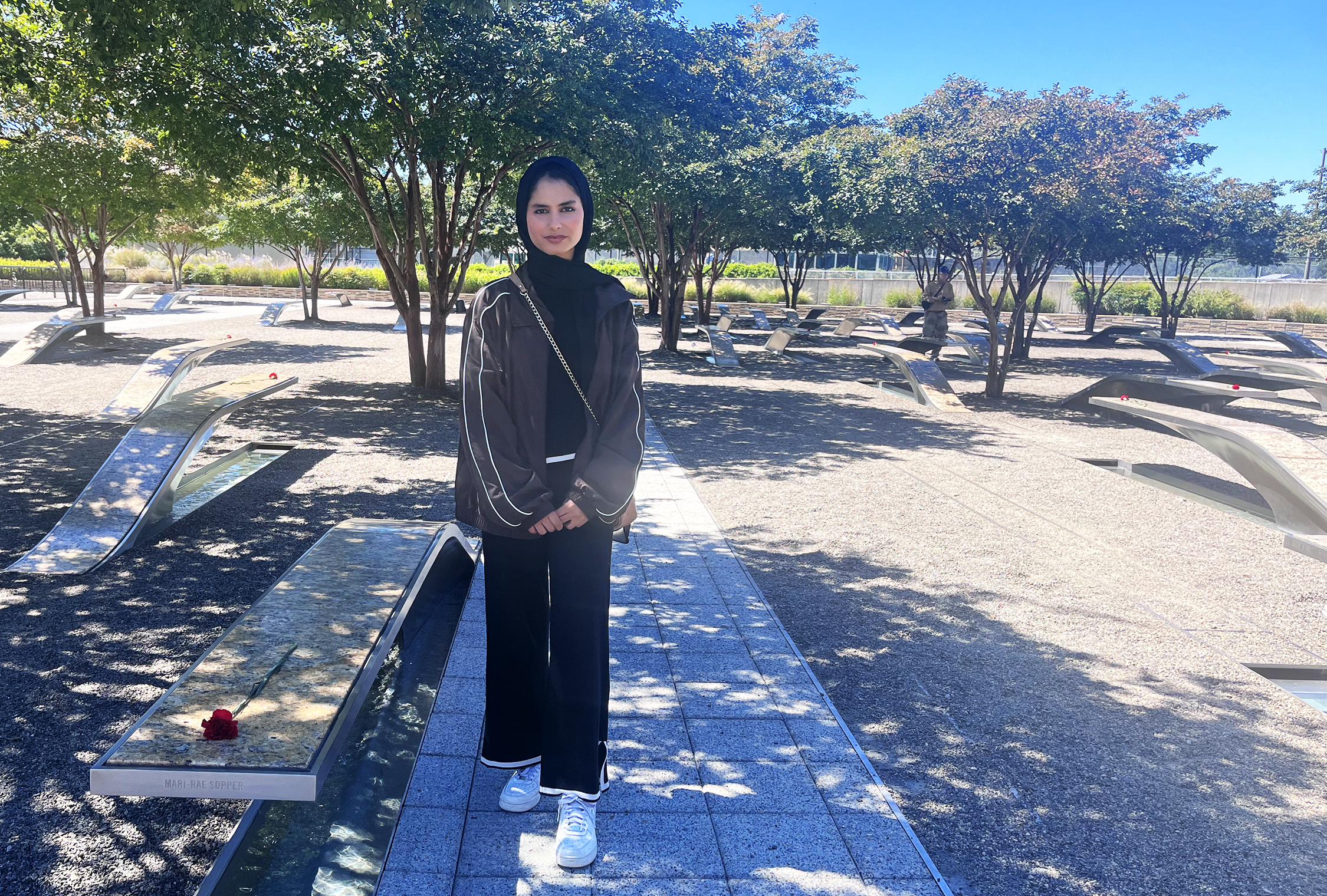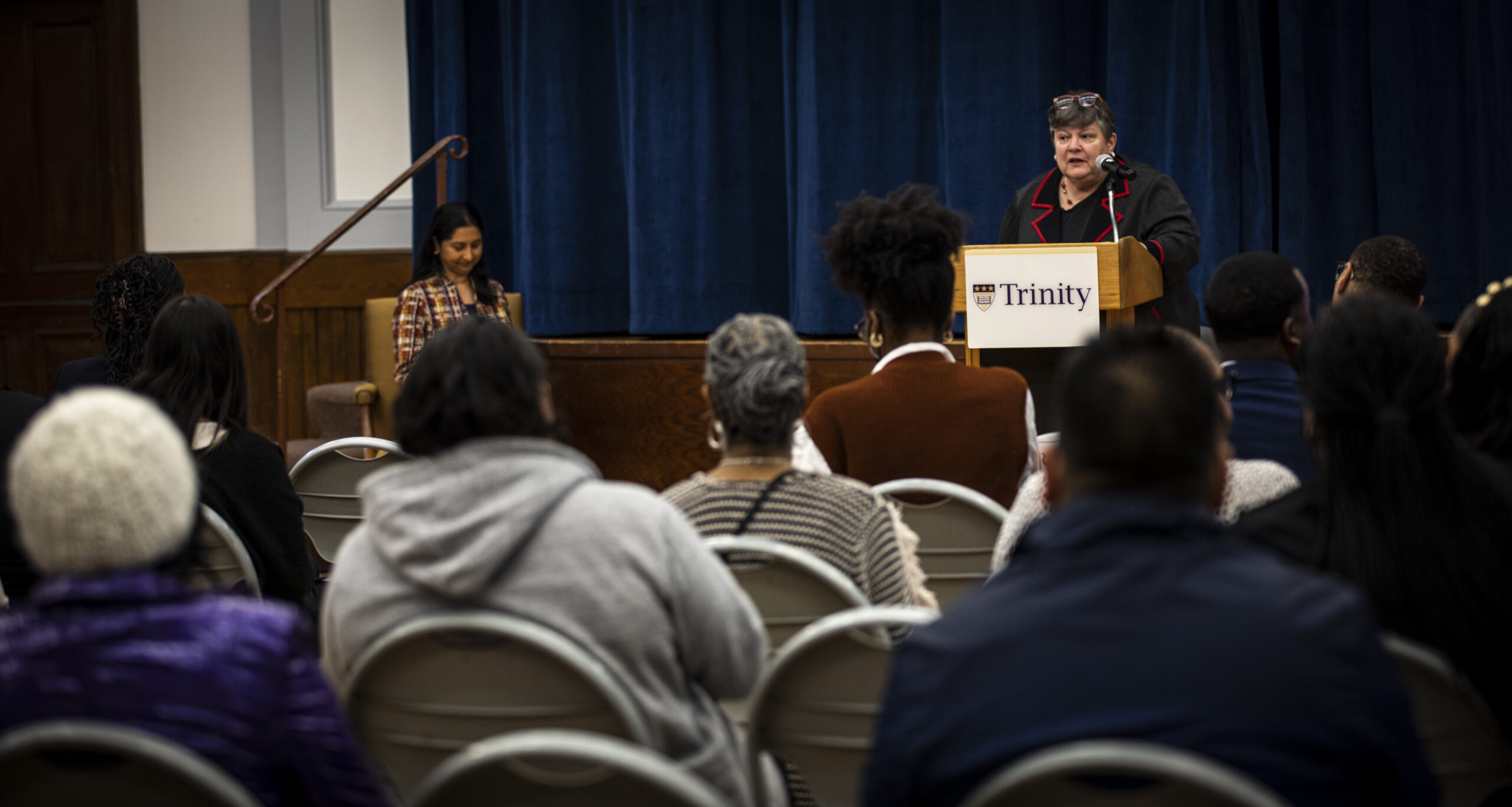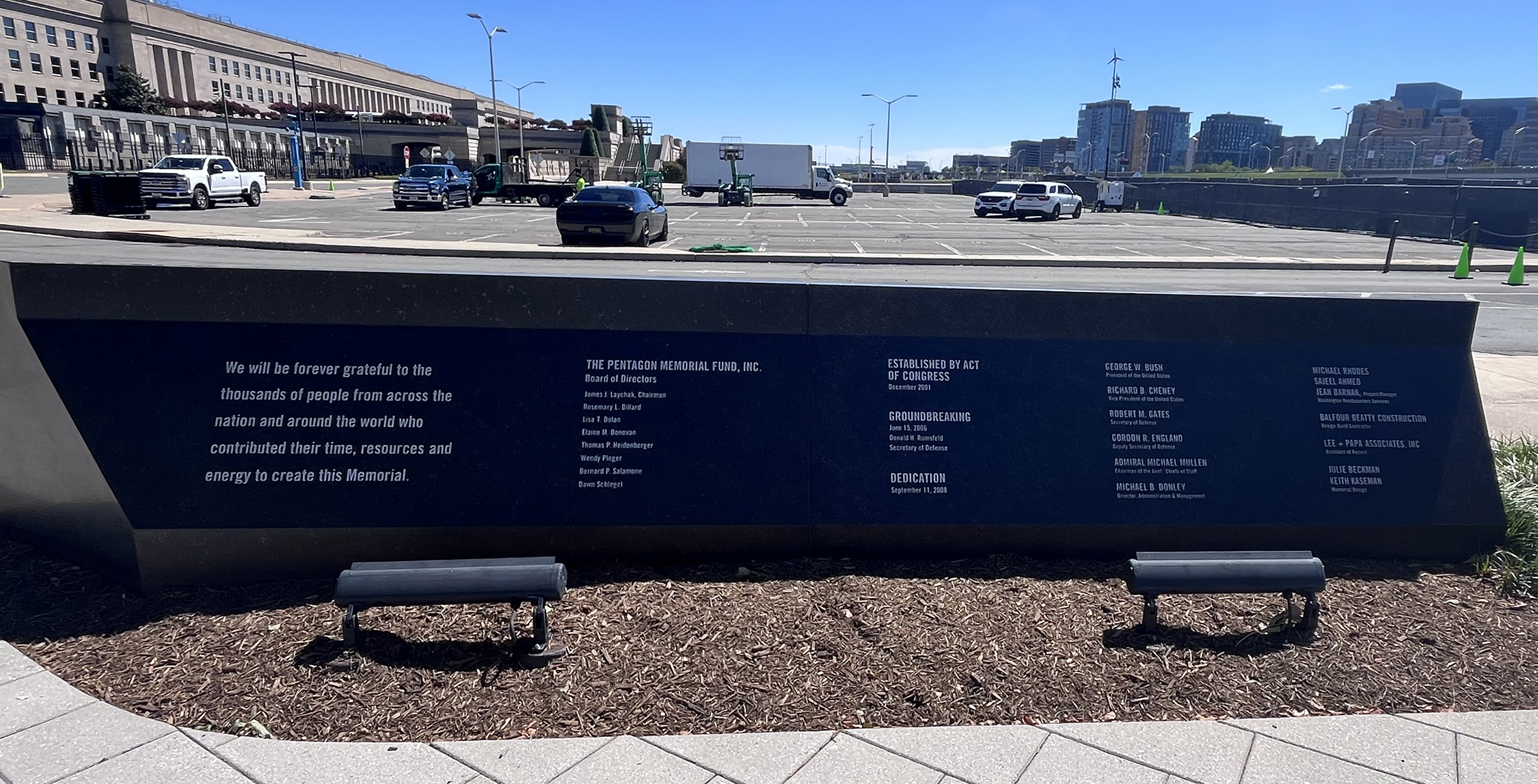
By Brittany McAlister
Trinity Times Correspondent
As U.S. citizens honor the anniversary of the Sept. 11, 2001, terrorist attacks, Trinity Washington University student Kia Rhoden plans to take a moment to pay tribute to the dead.
But the day doesn’t hold the same significance to Rhoden than it does for those who lived through the historic event.
“Sept. 11 doesn’t have a direct impact on me,” she said, adding that she has learned about the history of the terrorist attacks that led to two decades of war in Afghanistan and countless loss of life, and she understands that the annual anniversary is more meaningful to the generations of Americans who were born before her.
Rhoden was born in 2006 in Brooklyn, New York, five years after the devastating hijacked suicide plane crashes into the World Trade Center in New York, the Pentagon outside of Washington and in a field in Shanksville, Pennsylvania, carried out by al-Qaeda, an Islamic extremist group.
A large percentage of Trinity’s students were also born after the Sept. 11, 2001, attacks and look at it as a pivotal historic event.
However, they struggle to identify with the event, similarly to how their parent’s generation looked at the anniversary of the Dec. 7, 1941, Japanese attack on Pearl Harbor, which thrust the U.S. into World War II.
The 9/11 anniversary illustrates the generational divide in the Trinity community, where so many members of the faculty, staff and even some students have vivid memories of that day in 2001 and how it reshaped their way of life.
“That morning, I was in my office about 8:45 a.m. when the Provost Robert Preston stopped in to ask if I heard that a plane flew into the World Trade Center,” said Trinity President Patricia McGuire, who was already serving in her role at the university on Sept. 11, 2001.
McGuire had a small black and white camper TV near her desk, so she turned it on and saw video of the first plane flying into the building.

“Awful, but not alarming,” she said. “I went down the hall to our senior staff meeting scheduled to start at 9:30 am. Just as soon as we started the meeting, the security chief rushed in to say that a plane had crashed into the Pentagon and there was a rumor of bombs going off in Washington.”
The senior staff meeting ended early in light of the tragic events that had unfolded at the Pentagon and scores of students, faculty, and staff gathered in the campus’s Social Hall to find out what was happening to their country, which was clearly under attack by an enemy.
This is where they began finding out about this tragic and defining moment in modern history that reshaped the world in many ways, following the series of coordinated, devastating attacks on the United States.
Four commercial airplanes were hijacked with two of them crashing into the Twin Towers of the World Trade Center in New York City, causing the buildings to collapse.
Another plane crashed into the Pentagon in Arlington, Virginia, while the fourth plane, United Airlines Flight 93, crashed into a field near Shanksville, after passengers attempted to regain control of the aircraft from the hijackers.
The impact of the attacks is still felt today as societies continue to grapple with the complex issues of terrorism, security, and the protection of human rights.
“People were sobbing,” McGuire told Trinity Times. “A student came up to me, distraught and in fear that ‘they’ might bomb Trinity because of our red dome. Panic was setting in, and I also felt panic. Nothing had prepared me for this awful crisis.”
The 9/11 attacks resulted in the deaths of nearly 3,000 people, making it the deadliest terrorist attack on American soil in U.S. history, an event that shocked the world and permanently altered global security.
For those who lived through that day, the images of the Twin Towers collapsing and the Pentagon in flames are etched in their minds.
“In the weeks and months after the attacks, I experienced strong feelings of personal and social vulnerability,” said Steven Gable, an associate professor of Philosophy at Trinity who was teaching an English as a Second Language class at a private school in Washington on Sept. 11, 2001.
Gable and other faculty members at Trinity lived through the post-9/11 changes to the world and the country’s psyche, but he understands that many of his students will never be able to connect to the anniversary the same way he does.

According to Pew Research, members of Generation Z (people born between 1996 and 2010) have grown up in a post-9/11 world as the events of Sept. 11, 2001, are not firsthand memories, but rather historical events that have shaped their perception of the world as well as influenced the way they view issues of national security, terrorism, and foreign policy.
“I have found that young people today know a lot about 9/11 and truly appreciate the significance of the anniversary,” Gable told Trinity Times. “My students also demonstrate a great degree of curiosity about the events of that day.”
Nineteen-year-old Trinity sophomore Sadaf Ahmadi wanted to get a better understanding of what happened on that fateful day in 2001, so ahead of this year’s anniversary, she took a trip to the National 9/11 Pentagon Memorial in Virginia on Sept. 8, along with a Trinity Times reporter.

Ahmadi, who was born in Afghanistan in 2005, was visibly moved as she moved through the memorial site, stopping to read some of the names of the men and women who died there on 9/11.
She doesn’t remember the topic of 9/11 being discussed by her family when they lived in Afghanistan, and it wasn’t until they immigrated to the U.S. that she began to learn about the significance of that date.
“I was five years old when I came to the U.S.,” Ahmadi said. “When I started to attend American schools, this is how I learned about 9/11.”
The entire landscape of U.S. foreign and domestic policy, as well as of warfare itself, has changed profoundly in response to the 9/11 attacks, Gable said.
“Most college students today have lived their entire lives within the framework of these new, complex, and sometimes bewildering political and social changes,” he said. “That the U.S. government’s response to the 9/11 attacks has involved a complicated mix of military invasions and the installation of new governments (Afghanistan and Iraq), targeted attacks on suspected terrorists and their sponsors (often relying on sophisticated drone technology operated from remote locations), and heightened domestic and foreign surveillance.”
Another outcome of the 9/11 attacks was American racism directed at people of Middle Eastern descent, something Ahmadi has experienced in this country.
“I learned that some people have this ideology that all Muslims are terrorists and bad people,” she said. “Most people from Afghanistan don’t condone violence and are very loving people who respect others the way they would want to be treated.”
McGuire said that the nation was seriously damaged emotionally and culturally by 9/11 and is still suffering as a result.
“While political divisions always existed, 9/11 gave rise to the radical views that fuel some corners of our society – the suspicion of ‘the other,’ the hatred toward Muslims and persons of Middle Eastern descent,” she said. “The rise of ‘Make America Great Again’ as a political movement has roots in a sense of offense and fear and need for authoritarian action.”
Though Trinity senior Micheyla Stoney was born eight months after the Sept. 11 terrorist attacks, she’s heard the stories of how her mother experienced that day in Washington, just a few miles from the Pentagon crash.
“My mother described to me that everyone was tense and panicking,” Stoney said, adding that her older sister found out about the attacks when she arrived at school. “My generation can’t really speak on 9/11 as it was before our time.”
This is why Gable encourages his students to visit one of the memorials at the Pentagon, in New York and in Shanksville, and learn about the events of that day and how it served as a wake-up call to the world about the threat of terrorism and the need for vigilance in combating extremism.
He personally visited the 9/11 Memorial in New York City about ten years ago.
“It was a profoundly moving experience to view the personal objects and read the letters and messages left to honor and remember the individual victims of the attacks on the Twin Towers,” Gable said, calling the visit “both beautiful and haunting.”
Thank you, Brittany, for this balanced article on the way generations of Americans view this sorrowful day. The anniversary of 9/11 Brings some of us to clear and detailed recall, while most of our students relate through hearsay and, as you point out, visits to the sites where those planes crashed and so many lives were lost.
Thank you for pointing to the close proximity of Trinity to the wreckage, the experience of fear on that frightful day. For the sake of the 3,000, and their families and friends and colleagues, may we remember.